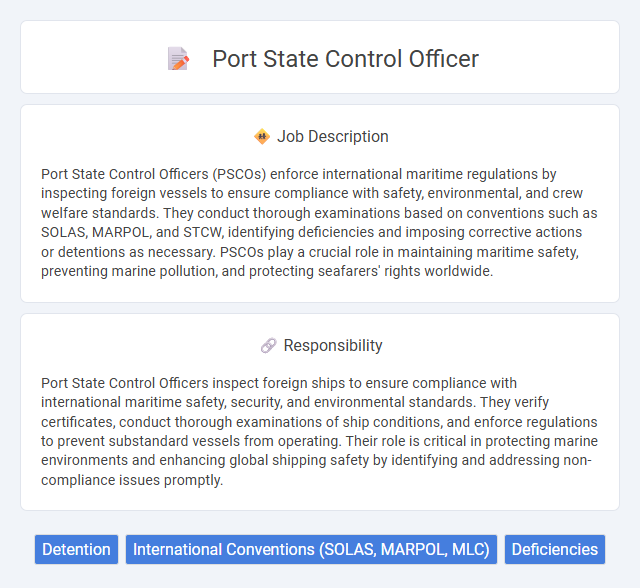
Port State Control Officers (PSCOs) enforce international maritime regulations by inspecting foreign vessels to ensure compliance with safety, environmental, and crew welfare standards. They conduct thorough examinations based on conventions such as SOLAS, MARPOL, and STCW, identifying deficiencies and imposing corrective actions or detentions as necessary. PSCOs play a crucial role in maintaining maritime safety, preventing marine pollution, and protecting seafarers' rights worldwide.
Port State Control Officers are likely to be suited for individuals who exhibit strong attention to detail and resilience, as the role frequently involves inspecting vessels for compliance with international regulations under potentially stressful conditions. Candidates with good communication skills and the ability to work independently or as part of a team may have a higher probability of performing well in this position. Those who can manage irregular hours and maintain professional objectivity while assessing the condition of ship personnel are more likely to adapt successfully to the demands of the job.
Qualification
Port State Control Officers must possess extensive knowledge of international maritime conventions such as SOLAS, MARPOL, and ISM Code, often supported by certifications like Certificate of Competency (CoC). A background in maritime engineering, naval architecture, or marine transportation, combined with experience at sea or in port operations, enhances their ability to conduct thorough vessel inspections. Proficiency in safety management systems, environmental regulations, and shipboard operational standards is critical for ensuring compliance and promoting maritime safety.
Responsibility
Port State Control Officers inspect foreign ships to ensure compliance with international maritime safety, security, and environmental standards. They verify certificates, conduct thorough examinations of ship conditions, and enforce regulations to prevent substandard vessels from operating. Their role is critical in protecting marine environments and enhancing global shipping safety by identifying and addressing non-compliance issues promptly.
Benefit
Port State Control Officers likely gain valuable experience by inspecting vessels to ensure compliance with international maritime regulations, which can enhance their professional skills and career prospects. They probably benefit from a dynamic work environment involving travel and interaction with diverse maritime professionals. The role may also offer job stability due to the ongoing global need for maritime safety and environmental protection.
Challenge
Port State Control Officer roles likely involve complex challenges related to enforcing international maritime regulations under varying and often stressful conditions. Officers probably face the difficulty of ensuring vessel compliance while managing diverse cultural and operational practices across different ships. The constant need for up-to-date technical knowledge and quick decision-making may also contribute to the demanding nature of this position.
Career Advancement
Port State Control Officers play a crucial role in enforcing maritime safety and environmental regulations by inspecting foreign vessels in national ports. Career advancement opportunities for these officers often include promotion to senior inspector roles, maritime safety auditors, or regulatory enforcement specialists within national maritime authorities. Gaining certifications such as ISM (International Safety Management) and STCW (Standards of Training, Certification, and Watchkeeping) significantly enhances prospects for leadership positions and specialized maritime consultancy roles.
Key Terms
Detention
Port State Control Officers (PSCOs) conduct thorough inspections of foreign vessels to enforce international maritime regulations, focusing on safety, security, and environmental standards. Detention occurs when a ship fails to meet these standards, indicating serious deficiencies that pose risks to crew, cargo, or the marine environment. PSCOs play a critical role in identifying non-compliance issues that lead to detention, ensuring substandard vessels are removed from service until deficiencies are rectified.
International Conventions (SOLAS, MARPOL, MLC)
Port State Control Officers (PSCOs) play a critical role in enforcing International Maritime Organization (IMO) conventions such as SOLAS, MARPOL, and the Maritime Labour Convention (MLC). They conduct inspections to verify that vessels comply with safety standards under SOLAS, pollution prevention regulations outlined by MARPOL, and seafarers' living and working conditions mandated by the MLC. PSCOs ensure maritime safety, environmental protection, and labor rights are upheld by detaining non-compliant ships to prevent unsafe or polluting operations.
Deficiencies
Port State Control Officers play a crucial role in inspecting vessels to ensure compliance with international maritime regulations. They identify and document deficiencies related to safety equipment, crew qualifications, pollution prevention, and navigational standards, which must be rectified before the ship can proceed. Effective management of these deficiencies helps maintain maritime safety and environmental protection by enforcing adherence to conventions such as SOLAS, MARPOL, and STCW.
 kuljobs.com
kuljobs.com